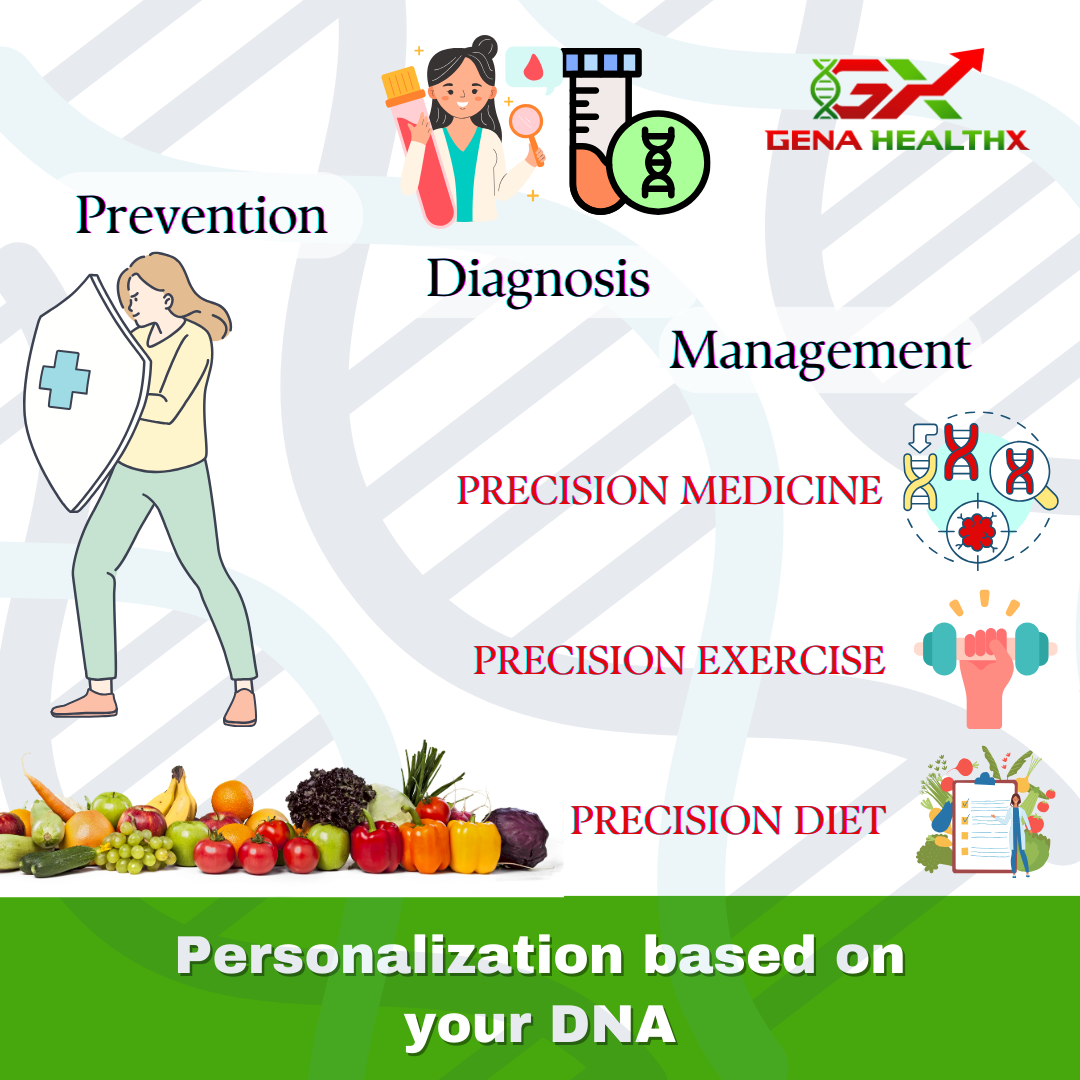Genetic testing, is an advanced approach towards contemporary healthcare, involves examining a person's DNA for mutations to detect the possibility of developing a genetic and inherited. Our overall health and susceptibility to disease depends majorly on our genes, besides other environmental factors. Genetic testing reports offer insights for the prevention, diagnosis and management of chronic diseases.

- Genetic testing as a predictive test provides information about possible health risks prior to the stage where symptoms start to appear.
- Genetic testing as a diagnostic test validates hereditary disorders.
- Genetic testing as a management approach gives people the information they need to make informed lifestyle choices, it has a significant impact on the prevention of illness.
- Genetic testing is a revolutionary step towards discovering a precise solution for enhancing individual health and wellness.
Benefits of genetic testing?
1. Early detection and risk assessment:
Genetic testing is a precision tool to determine the risk of genetic disease in advance. Examination of specific genetic markers, especially those which are related to the disease present in the family history, reveals the genetic predisposition and risk assessment to certain diseases. Genetic testing allows you to take precise and proactive actions for enhancing the overall health and wellness of the individual.
2. Genetic conditions and family planning:
Genetic analysts use carrier testing to determine the chances of a genetic mutation to be inherited by the current or future pregnancy. This information is crucial to stop the spread of hereditary disorders.
3. Personalized health care through pharmacogenomics:
Pharmacogenomics, which studies a person's genetic reaction to a drug, is used to customize medical treatments precisely. This individualized strategy helps doctors to maximize overall healthcare results by maximizing therapeutic efficacy and minimizing side effects.
4. Predictive and Diagnostic:
Genetic testing can provide diagnosis of a hereditary condition or information about developing one in the future by correlating genetic tests results with blood test reports. The predictive and diagnostic approach of genetic testing can be done for both healthy individuals as well as patients. As we share DNA with our family members, it becomes crucial for us to predict and diagnose the genetic condition present in the family history for early management.
5. Preventive Healthcare Actions:
Genetic testing can help identify the genetic predispositions to a certain disease, enabling proactive measures for prevention. Certainly, we can delay or lower down the risk of developing specific disorders by adopting healthy lifestyle choices, such as diet and exercise routines. This move to preventive healthcare is in line with the demand in the global movement that emphasizes proactive health management and wellness.
6. Self-determination and Well-Informed Choices:
Genetic test report provides precise solution for weight loss and chronic disease management. Following the specific recommendations from the genetic testing report gives people the power to actively manage their health. People can make informed healthcare decisions about lifestyle, screenings or medical interventions that enable a more precise and individualized approach to well-being.
How Does It Work?
Genetic testing is a sophisticated process that unveils insights of an individual's DNA, allowing for the identification of mutations or variations associated with a specific disease or inherited conditions. The fundamental steps involved in genetic testing are as follows:
1. Sample Collection:
Genetic tests are performed on a biological sample, usually a blood test, saliva sample, or cheek swab to look into DNA and get more insights on chromosomes and proteins. Technological developments have also contributed to the growing popularity of at-home DNA testing kits by making sample collection simple and easy.
2. DNA Extraction:
Once the sample is obtained, the next step is to extract the DNA from it. Specialized laboratory techniques are employed to isolate the genetic material from other components of the sample while maintaining the purity and integrity of the DNA.
3. The amplification
Sometimes there may not be enough DNA in the sample to allow for a thorough examination. A more in-depth analysis is made possible by amplification techniques like polymerase chain reaction (PCR), which creates numerous copies of the DNA.
4. Sequencing and Analysis:
The sequence of nucleotide bases (adenine, thymine, cytosine, and guanine) in the DNA strands is ascertained by sequencing the extracted or amplified DNA. Next-generation sequencing technologies have significantly expedited this step, making it more efficient and cost-effective. Following sequencing, the analysis phase begins. This involves employing advanced bioinformatics tools to sift through and interpret the complex data.
5. Identifying Genetic Variations
In order to find differences or mutations, the sequenced DNA is compared to a reference genome during the analysis. These variants can provide information about possible genetic disorders or risk of genetic predisposition. They can vary in size, from single nucleotide changes to more significant structural abnormalities.
6. DNA Genotyping for SNP Detection
In the realm of genetic testing, DNA genotyping emerges as another pivotal technique, particularly for Single Nucleotide Polymorphism (SNP) detection. SNPs, being the most frequent type of genetic variation among individuals, are instrumental in genetic analysis. They hold the key to understanding an individual's disease risk, drug response, and other unique genetic traits. Advanced genotyping platforms, such as those developed by Illumina, are at the forefront of this analysis. These high-throughput sequencing technologies facilitate the simultaneous examination of large arrays of SNPs. This process involves the strategic hybridization of DNA samples to specially designed chips embedded with probes targeting known SNPs. The result is a highly efficient, large-scale genotyping capability, essential in both clinical and research settings. The application of such cutting-edge technology is crucial for unraveling the complexities of genetic predispositions and paving the way for personalized medicine and healthcare solutions.
7. Interpretation and Reporting:
The results are interpreted by genetic counselors and healthcare professionals in light of the patient's family history and medical history. They assess whether there is a link between the identified genetic alterations with the increased risk of genetic and inherited conditions. After that, the results are combined into a comprehensive report.
8. Counseling and following care:
An essential component of the procedure is genetic counseling. Counselors help clients comprehend the implications of their DNA test results while addressing any potential psychological and ethical issues. The goal of this counseling is to give people the confidence to use the genetic information to make knowledgeable and well informed healthcare decisions.
Personalization through genetic testing
Healthcare experts including doctors, nutritionist and fitness experts can customize the complete healthcare solution based on an individual's genetic insights. This enables a more focused and precise approach, in the form of personalized diet plans, personalized fitness regime and personalizing drug regimen based on genetic responses.
DNA testing is essential not only for diagnosing genetic disorders but also for informing personalized treatment plans and advancing medical research. By understanding the genetic basis of diseases, healthcare professionals can tailor medical treatments to individual genetic profiles, marking a significant step forward in personalized medicine and genetic healthcare solutions.
Genetic Test Price in India
It is crucial to understand the various aspects that influence the cost of gene tests in India. Price ranges vary for pharmacogenomic testing, carrier screening, predictive testing, and diagnostic tests for particular illnesses. It's vital to ask about the included parts of the test package, including sample collection, DNA extraction, sequencing, analysis, and reporting, as larger labs may charge differently than smaller clinics. The total cost may also be affected if genetic counseling is necessary. It is recommended that individuals investigate health insurance coverage, possible government initiatives, or subsidies that may have an impact on the financial element of genetic test prices in India. It is advised to speak with healthcare providers or testing facilities directly to acquire precise and up-to-date price information.
Gena HealthX's Simplified Approach
The good news is that at Gena HealthX, you can integrate advanced genetics with nutritional expertise - all under one platform. Gena HealthX sets itself apart with wholesome genetic panels, covering every small parameter related to the chronic disease. They are curated by the expert geneticists - German scientists, who have more than 15 years of international experience in the field of genetics. Further the results of genetic testing are also analyzed by German scientists to get accurate and precise recommendations in terms of diet, exercise, lifestyle and drug response.
Gena HealthX offers individualized insights using sophisticated analytics, assisting individuals in comprehending their particular health condition and associated hazards. The platform makes it simple for users to track and understand numerous parameters by streamlining the management of health data.
Gena HealthX's comprehensive health monitoring goes beyond conventional tracking, offering insights into physical activity, sleep, nutrition, and stress levels. The platform provides consumers with practical strategies to take after deciphering intricate health insights. Gena HealthX facilitates an increased awareness of genetic predispositions by integrating genomic insights, hence supporting a proactive and preventative approach to wellbeing. Gena HealthX allows people to make knowledgeable decisions regarding their lifestyle, diet, and general health by providing them with continuous assistance and instructional materials.
Final Thought
The increasing availability of gene tests in India marks a significant advancement towards preventive healthcare. Personalized insights are gained by utilizing innovative genetic technologies, which facilitate a move from reactive to preventive health care. The growing availability of genetic testing signifies a dedication to precision healthcare as well as help in early disease identification. Gena HealthX is committed to using cutting-edge innovation and personalized care solutions to create a population that is healthier and better informed, as seen in this revolutionary environment.




